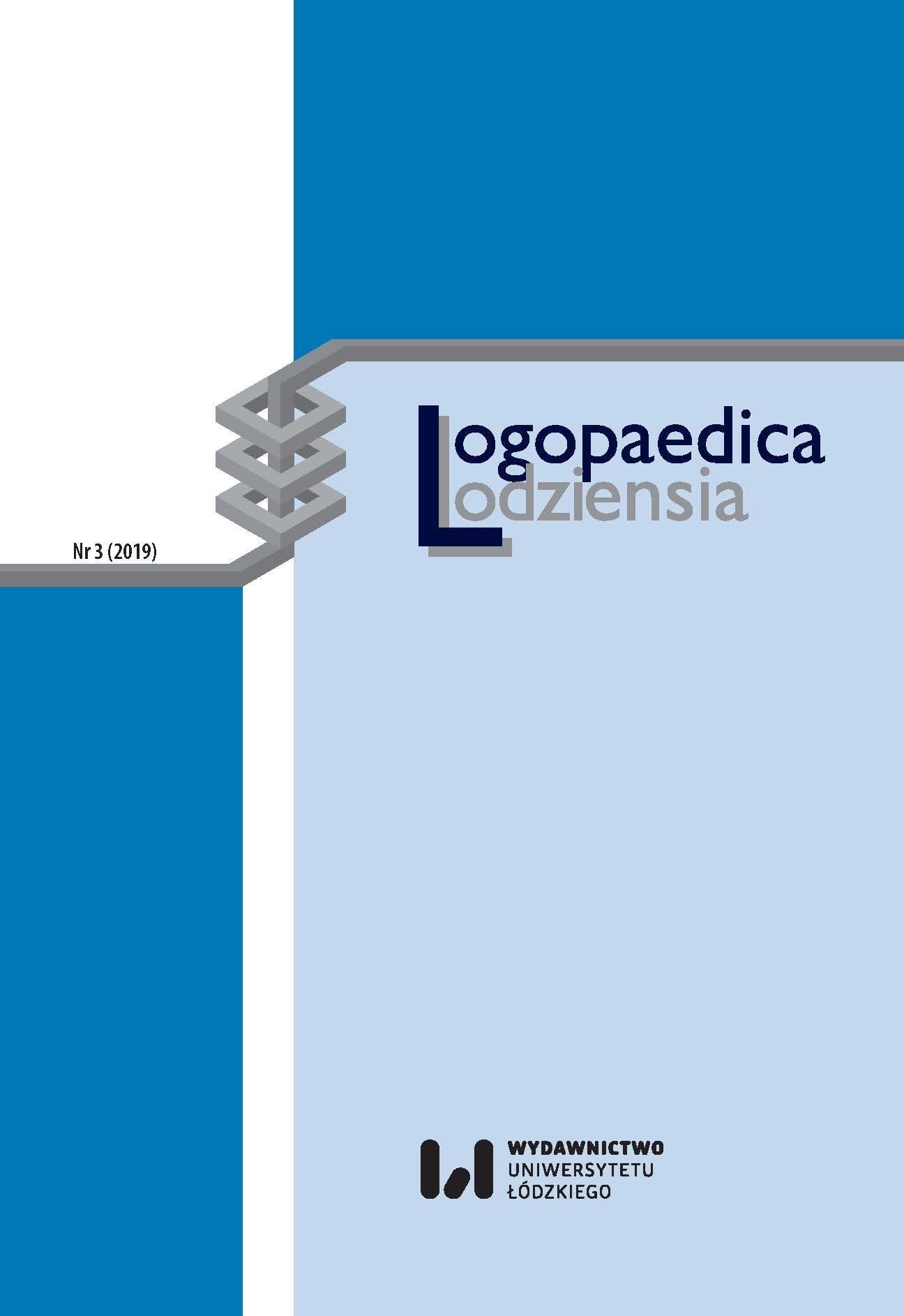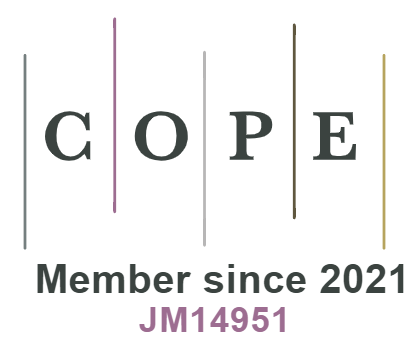Disintegration of lexical skills and the ability to communicate with the environment in the patient with moderate dementia in Alzheimer’s disease
DOI:
https://doi.org/10.18778/2544-7238.03.04Keywords:
anomy, Alzheimer’s disease, confrontational naming, dialogic utterance, monologic utteranceAbstract
The article analyzes the issues of anomy in Alzheimer’s disease, the leading symptom of speech pathology at the stage of dementia, in the context of the patient’s abilities to communicate with the environment in daily life. Using the example of a 73‑year‑old male patient with moderate dementia, the study discusses deficits recorded in logopedic tests, first of all in confrontational naming tests as well as in tests for constructing monologic and dialogic utterances, at the same time highlighting characteristic behaviors in the situations when the patient experiences language difficulties. The presentation of the phenomena takes into account the rich illustrative material in the form of obtained speech samples. Focusing on the lexical problems, the author identifies the possibilities of improving the anomic patient’s communication with his environment on the basis of recommendations contained in the FOCUSED program and WSPIERAM [I SUPPORT] program.
Downloads
References
Cuetos F., Gonzalez‑Nosti M., Martinez C., 2005, The picture‑naming task in the analysis of cognitive deterioration in Alzheimer’s disease, „Aphasiology”, no. 19(6), s. 545–557.
Google Scholar
DOI: https://doi.org/10.1080/02687030544000010
Domagała A., 2008a, Choroba Alzheimera – komunikacja z chorym. Poradnik dla opiekunów, Wrocław: Wydawnictwo Continuo.
Google Scholar
Domagała A., 2008b, Lexical skills in Alzheimer’s dementia (based on the material of dialogue utterances), „Psychology of Language and Communication”, vol. 12, no. 2, s. 89-105.
Google Scholar
DOI: https://doi.org/10.2478/v10057-008-0010-1
Domagała A., 2015, Narracja i jej zaburzenia w otępieniu alzheimerowskim, Lublin: Wydawnictwo Uniwersytetu Marii Curie‑Skłodowskiej.
Google Scholar
Domagała A., 2018a, Terapia pośrednia w otępieniu. Programy terapii, [w:] A. Domagała, E. Sitek, Choroba Alzheimera. Zaburzenia komunikacji językowej, Gdańsk: Wydawnictwo Harmonia Universalis, s. 258–281.
Google Scholar
Domagała A., 2018b, WSPIERAM. Terapia pośrednia w chorobie Alzheimera, [w:] A. Domagała, U. Mirecka (red.), Metody terapii logopedycznej, Lublin: Wydawnictwo Uniwersytetu Marii Curie‑Skłodowskiej, s. 373–385.
Google Scholar
Domagała A., 2018c, Zaburzenia językowych sprawności systemowych w chorobie Alzheimera. Charakterystyka na materiale języka polskiego, [w:] A. Domagała, E. Sitek, Choroba Alzheimera. Zaburzenia komunikacji językowej, Gdańsk: Wydawnictwo Harmonia Universalis, s. 71–99.
Google Scholar
Domagała A., Sitek E., 2018, Choroba Alzheimera w świetle aktualnych kryteriów diagnostycznych, [w:] Domagała A., Sitek E., Choroba Alzheimera. Zaburzenia komunikacji językowej, Gdańsk: Wydawnictwo Harmonia Universalis, s. 26–44.
Google Scholar
Grabias S., 2001, Język w zachowaniach społecznych, Lublin: Wydawnictwo Uniwersytetu Marii Curie‑Skłodowskiej.
Google Scholar
Hamilton H. E., 1994, Conversations with an Alzheimer’s Patient: An Interactional Sociolinguistic Study, Cambridge: University Press.
Google Scholar
DOI: https://doi.org/10.1017/CBO9780511627774
Herzyk A., 2005, Wprowadzenie do neuropsychologii klinicznej, Warszawa: Wydawnictwo Naukowe Scholar.
Google Scholar
Marczewska H., 1994, Zaburzenia językowe w demencji typu Alzheimera i demencji wielozawałowej, [w:] H. Marczewska, E. Osiejuk, Nie tylko afazja... O zaburzeniach językowych w demencji Alzheimera, demencji wielozawałowej i przy uszkodzeniach prawej półkuli mózgu, Warszawa: Wydawnictwo Energeia, s. 7–60.
Google Scholar
Newhart M., Davis C., Kannan V., Heidler‑Gary J., Cloutman L., Hillis A. E., 2009, Therapy for naming deficits in two variants of primary progressive aphasia, „Aphasiology”, vol. 23(7–8), s. 823–834.
Google Scholar
DOI: https://doi.org/10.1080/02687030802661762
Ousset P. J., Viallard G., Puel M., Celsis P., Demonet J. F., Cardebat D., 2002, Lexical therapy and episodic word learning in dementia of the Alzheimer type, „Brain and Language”, no. 80, s. 14–20.
Google Scholar
DOI: https://doi.org/10.1006/brln.2001.2496
Powell J., 2014, Pomoc w komunikacji w demencji (Polonische Ausgabe von Hilfen zur Kommunikation bei Demenz” von Jennie Powelll. Heft 2 der Reihe – Demenz‑Service), Köln: Kuratorium Deutsche Altershilfe.
Google Scholar
Ripich D. N., [b.r.], The FOCUSED Program. A communication guide for Alzheimer’s Disease, Caregiver’s Manual [archiwum autorki].
Google Scholar
Shuren J., Geldmacher D., Heilman K. M., 1993, Nonoptic aphasia: Aphasia with preserved confrontation naming in Alzheimer’s disease, „Neurology”, no. 43, s. 1900–1907.
Google Scholar
DOI: https://doi.org/10.1212/WNL.43.10.1900
Sitek E., 2018, Mowa w chorobie Alzheimera, [w:] A. Domagała, E. Sitek, Choroba Alzheimera. Zaburzenia komunikacji językowej, Gdańsk: Wydawnictwo Harmonia Universalis, s. 62–71.
Google Scholar
Downloads
Published
How to Cite
Issue
Section
License

This work is licensed under a Creative Commons Attribution-NonCommercial-NoDerivatives 4.0 International License.












